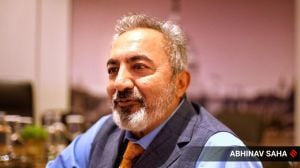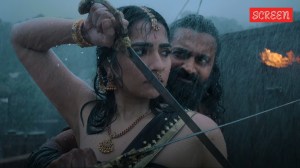Ritu Sarin is Executive Editor (News and Investigations) at The Indian Express group. Her areas of specialisation include internal security, money laundering and corruption. Sarin is one of India’s most renowned reporters and has a career in journalism of over four decades. She is a member of the International Consortium of Investigative Journalists (ICIJ) since 1999 and since early 2023, a member of its Board of Directors. She has also been a founder member of the ICIJ Network Committee (INC). She has, to begin with, alone, and later led teams which have worked on ICIJ’s Offshore Leaks, Swiss Leaks, the Pulitzer Prize winning Panama Papers, Paradise Papers, Implant Files, Fincen Files, Pandora Papers, the Uber Files and Deforestation Inc. She has conducted investigative journalism workshops and addressed investigative journalism conferences with a specialisation on collaborative journalism in several countries. ... Read More
Gopal is more than a fan with a copycat moustache
Chennai, September 19: The Nakkeeran office is a nondescript double-storeyed building in the crowded Harrington Road area. Walk inside and...

Chennai, September 19: The Nakkeeran office is a nondescript double-storeyed building in the crowded Harrington Road area. Walk inside and you know this space belongs to R R Gopal, artist turned editor turned Government emissary turned negotiator turned your only link with Veerappan. There are posters of tigers on the office wall but the most telling display is in the reception area — a glass case with a wax model of Veerappan’s head.
These days, in between rounds of negotiations, Gopal spends his day meeting Government functionaries and speaking to journalists. With his flowing Veerappan-copycat moustache, a tiger-print tapestry behind his chair and drawing instruments in front — these will be used to design Nakkeeran’s next cover — this man is the closest a visiting reporter can get to the Veerappan story.
Gesticulating wildly as he describes his encounters, Gopal says, “I cannot say when but Rajkumar will return home safe. Veerappan has promised me that.”
Hardly anyone grudges Gopal his popularity or the fact that for many years now, a single subject has been pushing up the sales of the bi-weekly, known for its sensational, abloid style. But in private, senior police and Government officials snigger and ask questions: How does Gopal walk in and out of the jungle so effortlessly? Who was there to check if he was carrying in arms or money for Veerappan?
Media circles in Chennai are abuzz with talk of Gopal’s “Veerappan tapes” becoming hot currency and about how at least two Delhi-based publishers were vying for English rights of his interviews. These interviews were published by Nakkeeran in a Tamil book Mudhal Vettaiyum Mudhal Kolaiyum (First hunt, first kill) and later aired on Sun TV. As an update, Gopal has transcripts of the tapes he has ferried back from the Satyamangalam forests this time.
Gopal denies reports of a pay-off and says that along with the police version, Veerappan’s own story should be taken note of. This is a view gaining credence among a section of the press and academia, especially since the fate of the 51 TADA detenues — mostly suspected informers — whose release Veerappan has demanded, has become inextricably linked with the hostage issue.
Among those arguing in favor of a wider debate is M S S Pandian, fellow at the Madras Institute of Development Studies (MIDS), who says Gopal’s taped interviews present a fascinating story. “The tapes tell a story of exploitation and misadventure which is familiar but also very important,” he notes. “Veerappan simply cannot be labelled a criminal and hanged. His allegations of atrocities must be placed evenly against reports of atrocities allegedly committed by him.”
Pandian recently translated portions of Gopal’s book with these samples from Veerappan’s life:
* On justice in his jungle raj: “When I discuss one case, ten cases will be waiting to be settled. They will not allow me to sleep even in the night…they come to me not only from the forest area but also from the towns.”
* On why he kills elephants: “We target and shoot into the forehead of the elephant. It slumps to death without even knowing that life is departing. Good death. Eighty four lakhs of living beings like birds and ants would eat it…of all charity feeding is the greatest.”
* On politicians, police: Veerappan recalls that a Superintendent of Police (SP), hot on his pursuit, had routinely feasted on goats and sheep of the villagers. The SP was injured in a landmine attack and as Veerappan told Gopal: “At least the goats are now free.”
He also names a local MLA alleged to be smuggling every day four lorry loads of rosewood from the forest.“Somehow, the check-post gates opened automatically to let pass the MLA’s truck!”
Interestingly, after these interviews were aired on TV, some senior police officers felt that Veerappan’s admissions could be used as clinching evidence against him. But with the NHRC’s panel, headed by former Karnataka High Court judge A J Sadashiva, already looking into complaints of police atrocities, the tapes could turn the tables against the police.
A majority of allegations such as rape and plunder are against former officials of the STF.
P Bhaskar, Deputy Commissioner of Police (DCP) in Chennai, who served a stint in the STF, admits that the inquiry has been a setback for the police. “The NHRC’s probe has been the biggest blow to the operations. Everyone has begun to look at the police with suspicion,” he says.
Last week, police petitioners in Karnataka managed to get a stay on further hearings of the Sadashiva Committee and Tamil Nadu Government police department requested the NHRC to hold in-camera hearings. Future moves and counter-moves are being keenly watched and undoubtedly, what Nakkeeran puts out will be crucial in the moulding of public opinion.
Photos





- 01
- 02
- 03
- 04
- 05



























